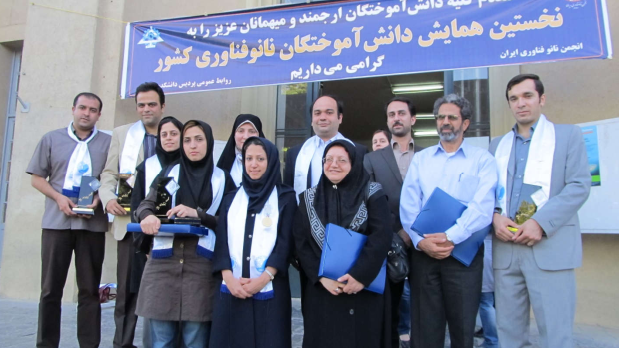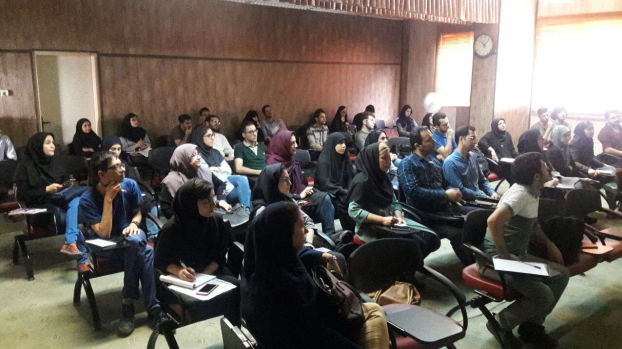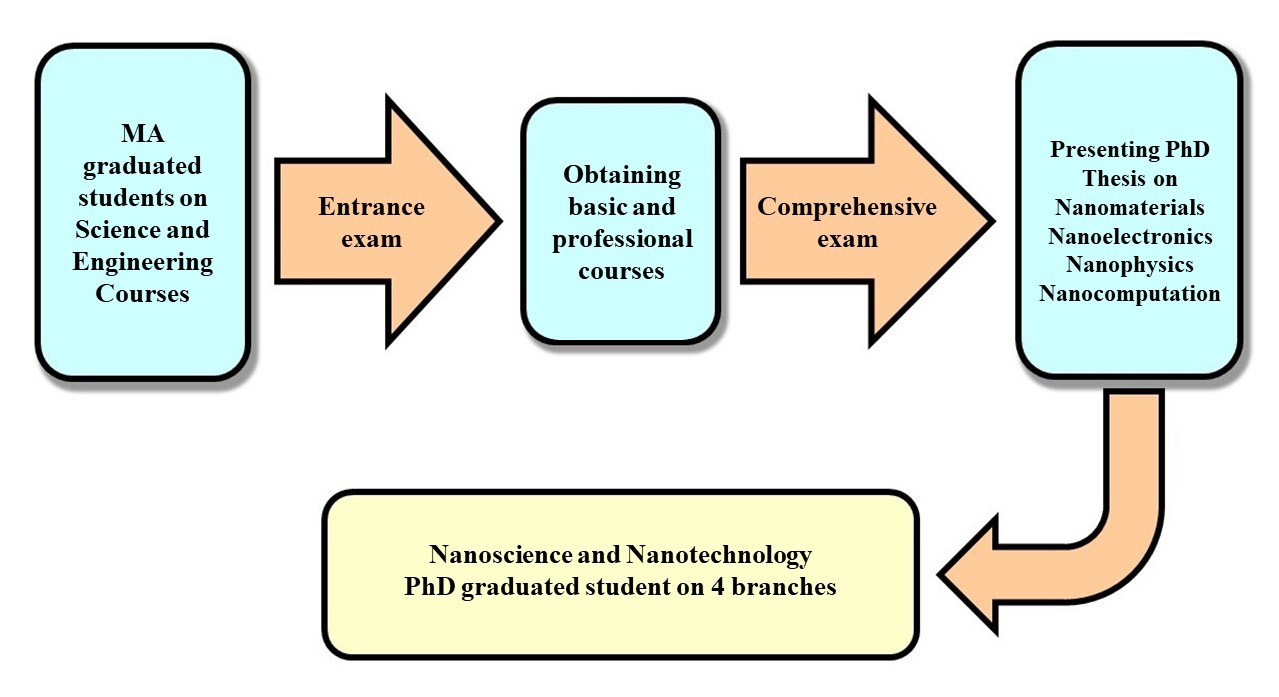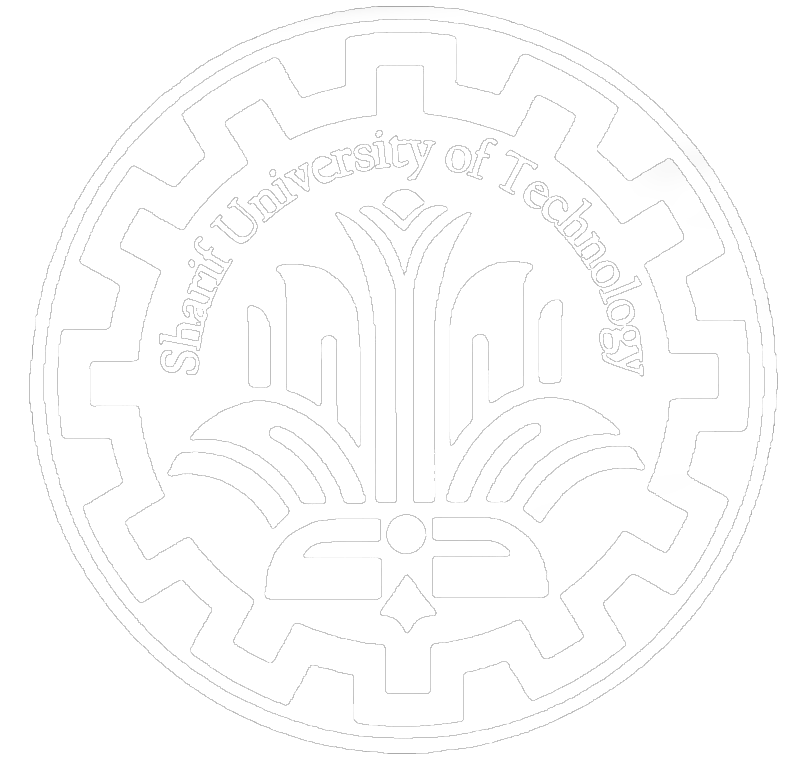Center for Nanoscience & Nanotechnology
PhD Program
1) General educational objectives of the program:
A. Efforts towards education and learning of nanoscience at the global level and expanding the frontiers of knowledge in the following areas:
- Synthesis of materials, fabrication of nanostructures, nano components, and related tools.
- Characterization and measurement of properties.
- Analysis, design, fabrication, and simulation of nano materials and systems.
B. Nurturing capable and efficient human resources to utilize nanoscience knowledge in research, industrial, and economic sectors of the country.
C. Establishing connections with relevant national and international scientific centers through study opportunities and organizing seminars and conferences.

2) Characteristics of the program:
In developing this program, the following characteristics have been taken into consideration:
A. Attention to interdisciplinary nature in the development of the educational program.
B. Emphasis on utilizing all research facilities and the potential of faculty members inside and outside the university.
C. Integration of education and research with a technology-oriented approach.
D. Creating opportunities for graduates from related science and engineering fields to enter the program.
E. Up-to-date education on interdisciplinary topics to empower graduates for group activities.
F. Emphasis on presenting seminars, participating in conferences, and utilizing study opportunities.

3) Admission and Student Selection Requirements:
Admission and student selection requirements comply with the regulations and educational and research bylaws of doctoral programs at Sharif University of Technology. According to the announced bylaw, the following criteria are taken into consideration:
A. Holding a master's degree in basic sciences and engineering fields.
B. Passing written and oral exams.
C. Sufficient command of English language.
Note 1: Students who meet the requirements of the university's "Talented Student Program" can participate only in the scientific interview after being reviewed and approved.
Note 2: Applicants who are studying in the Master's degree program at the time of the entrance exams must have graduated at the time of registration.
Note 3: Student admission will be based on academic records, research activities, and recommendation letters. The qualification approval is the responsibility of the Nanoscience and Technology Center Council.
4) Duration of the Program and Educational System:
The duration of the program complies with the regulations of the university and includes two educational and research periods. The diagram below illustrates the program's outline.

Figure 1. Admission process and doctoral program in Nanoscience and Technology.
A: Educational Program
The educational program consists of 18 units of general and specialized courses. The program lasts for a maximum of 4 semesters, and is based on the approved syllabus of the PhD program in Nanotechnology (Courses) as follows:
- Compensatory courses (3 units): Their inclusion is at the discretion of the center without affecting the overall GPA.
- Mandatory courses (10 units) including general and specialized seminars (a total of 11 units): These courses are mandatory for all students in various fields of nanotechnology and provide an introduction to the different areas of nanotechnology.
- Elective courses (minimum of 7 units): The selection of specialized courses depends on the chosen field of the students and are offered in research groups active in the nanotechnology center.
B: Research Phase and Thesis Preparation
-
Comprehensive Exam: This exam is conducted in written form and registration is subject to the approval of the university's language score and passing all 18 units of the educational program with a minimum GPA of 16 from 20 or passing 12 units with a minimum GPA of 17 from 20.
-
Proposal Defense: After the comprehensive exam, the student, based on their research priorities and scientific interests, formulates a research proposal under the guidance of the institute's professors and presents it to the institute council. It should be noted that due to the interdisciplinary nature of the program, the student's thesis supervisor team should consist of at least two permanent faculty members or research colleagues of the institute.
-
Research Section: The research section of the doctoral program, under the complete supervision of the thesis supervisor, usually lasts until the end of the eighth semester (with a registration of 6 units for three semesters and 2 units for one semester). If the student wishes to continue beyond the tenth semester, they must register after obtaining approval for postgraduate studies.
-
Study Opportunity: Acceptance of requests to participate in a study opportunity outside the country (3 to 6 months) is subject to the approval of the thesis supervisor and submitting at least one paper from the research activities of the doctoral program to international (ISI) journals and receiving a valid invitation from the destination university.
-
Thesis Defense: The doctoral defense is subject to publishing papers extracted from the doctoral thesis in reputable ISI-listed journals with a minimum impact factor of 3 with the affiliation of the student at the Center for Nanoscience and Nanotechnology, Institute for Convergence Science and Technology of Sharif University of Technology.
Furthermore, at the end of the research period, the student must submit their thesis in Persian and, after the approval of all thesis supervisors, a summary of the thesis in English, printouts of published papers in journals, conferences and technological achievements from the doctoral research period that can be presented at exhibitions and industries to the research institute. After reviewing and approving them in the council, the internal and external evaluation committee for the student is determined.
